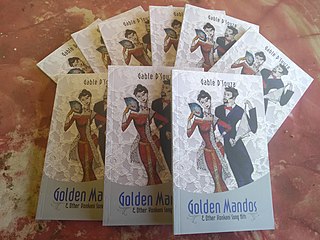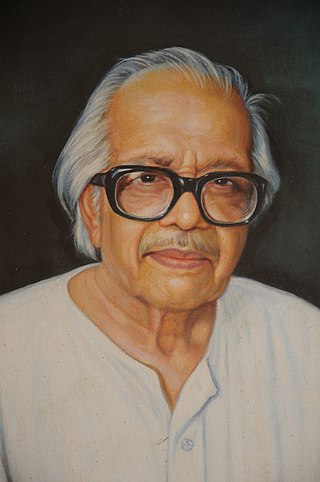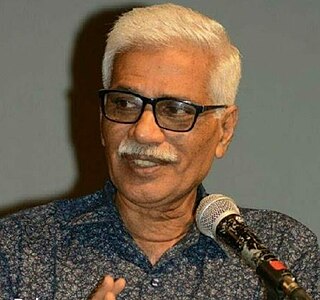Related Research Articles

Konkani is an Indo-Aryan language spoken by the Konkani people, primarily in the Konkan region, along the western coast of India. It is one of the 22 scheduled languages mentioned in the Indian Constitution, and the official language of the Indian state of Goa. It is also spoken in Karnataka, Maharashtra, Kerala, Gujarat as well as Damaon, Diu & Silvassa.

Goan literature is the literature pertaining to the state of Goa in India.

Music of Goa refers to music from the state of Goa, on the west coast of India. A wide variety of music genres are used in Goa ranging from Western art music to Indian classical music. Konkani music is also popular across this tiny state. Being a former territory of Portugal, Goa has a dominant western musical scene with the use of instrument such as the violin, drums, guitar, trumpet and piano. It has also produced a number of prominent musicians and singers for the world of Indian music. Portuguese Fado also has significance in Goa.

Media in Goa refers to the newspapers, magazines, radio stations, cable and television networks and online media in India's smallest state. Over the past two-and-half decades, the Goa-linked online media has also grown.

Mangalorean Catholics are an ethno-religious community of Latin Christians from the Diocese of Mangalore and the erstwhile South Canara area, by the southwestern coast of present-day Karnataka, India.

Ravindra Kelekar was a noted Indian author who wrote primarily in the Konkani language, though he also wrote in Marathi and Hindi. A Gandhian activist, freedom fighter and a pioneer in the modern Konkani movement, he was a well known Konkani scholar, linguist, and creative thinker. Kelekar was a participant in the Indian freedom movement, Goa's liberation movement, and later the campaign against the merger of the newly formed Goa with Maharashtra. He played a key role in the founding of the Konkani Bhasha Mandal, which lead the literary campaign for the recognition of Konkani as a full-fledged language, and its reinstatement as the state language of Goa. He authored nearly 100 books in the Konkani language, including Amchi Bhas Konkaneech, Shalent Konkani Kityak, Bahu-bhashik Bharatant Bhashenche Samajshastra and Himalayant, and also edited Jaag magazine for more than two decades.
The Goa liberation movement was a movement which fought to end Portuguese colonial rule in Goa, Portuguese India. The movement built on the small scale revolts and uprisings of the 19th century, and grew powerful during the period 1940–1961. The movement was conducted both inside and outside Goa, and was characterised by a range of tactics including nonviolent demonstrations, revolutionary methods and diplomatic efforts. However, Portuguese control of its Indian colonies ended only when India invaded and annexed Goa in 1961, causing a mixture of worldwide acclaim and condemnation, and incorporated the territories into India.
Casimiro Emérito Rosa Teles Jordão Monteiro, also known as Agente Monteiro, was a Portuguese covert operations military intelligence officer and law enforcement officer during the Estado Novo regime. He carried out state-sanctioned bombings and assassinations in Portugal, Mozambique and Goa. His actions were mostly focused against members of independence movements that existed in the Portuguese colonial empire.
Manohar Rai Sardesai was an Indian Konkani poet, writer and French translator. He received his Doctorat ès lettres françaises for his thesis "L'image de l'Inde en France" from the University of Sorbonne. He has been credited for an upsurge of modern Konkani poetry. Sardesai died in 2006.

Old Goan Gold is a music album by Remo Fernandes and released in 1985. It consists of songs in Konkani and Portuguese. Alisha Chinai has also performed in the album.

Armando Menezes (1902–1983) was an Indian civil servant, writer, academic and poet who wrote in English.

Goa is a state on the southwestern coast of India within the Konkan region, geographically separated from the Deccan highlands by the Western Ghats. It is bound by the Indian states of Maharashtra to the north, and Karnataka to the east and south, with the Arabian Sea in the west. It is India's smallest state by area and fourth-smallest by population. Goa has the highest GDP per capita among all Indian states, two and a half times as high as the GDP per capita of the country as a whole. The Eleventh Finance Commission of India named Goa the best-placed state because of its infrastructure, and India's National Commission on Population rated it as having the best quality of life in India. It is the second-highest ranking among Indian states in the human development index.

Madhav Borkar is an Indian noted Konkani poet, former station director of All India Radio and Konkani litterateur.

Alegre Roque Teodoro Antao, known professionally as Star of Arossim, was an Indian singer, composer, dramatist, director, and actor who primarily worked on the Konkani stage. Regarded as a multifaceted artiste and one of the stalwarts of the Konkani stage. A skilled bongo and conga player, he is best known for being part of the Bomboikar Group for their biannual shows.
Krishna Laxman Moyo was an Indian theatre actor, comedian, singer-songwriter, and playwright known for his work in tiatr productions and radio programmes.

Libia "Libby" Lobo Sardesai is an Indian independence activist from Goa. Along with Vaman Sardesai, whom she later married, she ran an underground radio station, Voice of Freedom, that transmitted across Portuguese Goa from 1955 to 1961, advocating the cause of the Goan independence movement. Following the Liberation of Goa, she was the first Director of Tourism of Goa, Daman and Diu.

Vaman Balkrishna Naique Prataprao Sardesai was an Indian poet, freedom fighter and diplomat from Goa. Along with Libia Lobo Sardesai, whom he later married, he ran an underground radio station, Voice of Freedom, that transmitted across Portuguese Goa from 1955 to 1961, advocating the cause of the Goan independence movement. Following the Liberation of Goa, he became the second editor of Goa Today magazine, and went on to become an IAS officer, serving as the Indian Ambassador to Angola. In 1992, he was awarded the Padma Shri. He has also been the co-convenor of INTACH.

Evágrio Jorge was an Indian freedom fighter and journalist.

Nicolau Menezes was an Indian independence activist and teacher from Goa. Along with Vaman Sardesai and Libia Lobo, he ran an underground radio station, Voice of Freedom, that transmitted across Portuguese Goa from 1955 to 1961, advocating the cause of the Goan independence movement.
References
- 1 2 3 4 Kale, Sharwari (2021-06-08). "The Voice Of Freedom- Goa's Underground Radio Station". Homegrown. Archived from the original on 2023-12-21. Retrieved 2023-12-21.
- 1 2 3 Antao, Steve (2015-12-19). "RADIO - WOMAN'S VOICE OF FREEDOM". ItsGoa. Archived from the original on 2023-12-21. Retrieved 2023-12-21.
- 1 2 3 4 IANS. "'Voice of Freedom' and the battle for airwaves over Goa". Deccan Herald. Archived from the original on 2023-12-21. Retrieved 2023-12-21.
- 1 2 3 4 "Voice of freedom: From the jungles to the skies". The Times of India. 2021-12-19. ISSN 0971-8257. Archived from the original on 2023-12-25. Retrieved 2023-12-25.
- 1 2 "All you need to know about Voice of Freedom - Goa's underground radio station". The Economic Times. 2017-08-15. ISSN 0013-0389. Archived from the original on 2020-11-11. Retrieved 2023-12-25.
- ↑ Ali, B. Sheikh (1986). Goa Wins Freedom: Reflections and Reminiscences. Goa University. ISBN 978-81-85571-00-3. Archived from the original on 2023-12-25. Retrieved 2023-12-25.
- ↑ Salgaonkar, Seema P. (2006). Women, Political Power, and the State. Abhijeet Publications. ISBN 978-81-88683-95-6. Archived from the original on 2024-01-02. Retrieved 2023-12-25.
- 1 2 Mahotsav, Amrit. "A Clandestine Radio Called "Voice of Freedom"". Azadi Ka Amrit Mahotsav, Ministry of Culture, Government of India. Archived from the original on 2024-01-02. Retrieved 2023-12-25.
- 1 2 Desai, Anita A. Raut (2003). "Voices in the liberation struggle the case of goa 1947 6" (PDF). Goa University.
- ↑ Antao, Steve (2015-12-19). "RADIO - WOMAN'S VOICE OF FREEDOM". ItsGoa. Archived from the original on 2023-12-21. Retrieved 2023-12-25.
- ↑ "BBC World Service - Witness History, Goan Independence". BBC. Archived from the original on 2023-12-25. Retrieved 2023-12-25.